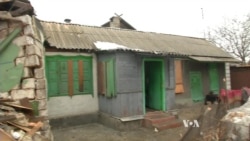People in eastern Ukraine’s Donetsk and Luhansk districts find themselves squarely in the path of advancing Russian-backed rebels, who want to take back the territory they held at the beginning of the conflict last year.
Many local residents are afraid, but others would welcome the change — even when a rebel shell lands in their neighborhood.
In the Luhansk district town of Papasna, just 15 kilometers from where the Ukrainian government marks the front line, a house belonging to a couple named Valentina and Yuri was destroyed this week by a Russian-made Grad missile, officials said.
Valentina was home at the time. She said something hit her in the head and she fell down. She couldn’t see, but she crawled in the direction of the doorway.
“I came out and nothing was left," she said. "The house is gone. Nothing is left. I was in shock. I’m in shock now, because I grew up in this house. It was my parents’ house. My father built it with his own hands.”
Yuri held what he said were fragments of the missile. He said the authorities took away the larger pieces.
"I don’t know how my wife survived," he said. "It’s incredible. It seems this is the front line.”
Yuri and Valentina have moved to an apartment elsewhere in town, but Valentina said she wouldn't go any farther.
“I will never go anywhere away from my motherland," she said. "My parents’ graves are here. I was born here. I grew up here. I will never leave this place.”
Down the street, the arrival of reporters and Ukrainian officials sparked an argument. Some neighbors said they were eager for the rebels to return.
A man named Nikolai, a retired paramilitary guard who has sent his children to safety in Russia, said, "We didn’t ask you to come from the West. Mind your own business. Go to church! Do whatever you want! We just want this. If we want to go to church, we go. We want to live here and work. We don’t need anything else.”
His neighbor Alla, a retired glassworks engineer, said she just wanted to go back to the way things were before the war started last summer.
“We lived here mixed — northern Russians, Ukrainian and Russians, mixed," she said. "Your mother could be Ukrainian and your father could be Russian. Russians came here to restore Donbas, the mines. Everything was fine. We want peace, peace and peace.”
At City Hall, workers prepared plastic sheeting to patch damaged windows and roofs, and they worried about the rebel advance.
“I’m scared, very scared," said Natalia, a city worker. "But what to do? We are living. We don’t have any place to go, so we live, and work.
"We work under shelling. It’s scary, but still ... ," she said with a shrug.
Another city worker, Olga, said, "We can leave. We have a place to go. But I can’t. I have my parents here. I just can’t leave. I can’t allow myself. We sent our child, but it hurts so much.”
A statue of Lenin still presides in the Papasna city square, and the winter gloom seems to accentuate the mood. Part of a story with geopolitical implications is playing out here. And whatever their political leanings, local residents feel profound change may be coming again to their once-ordinary town, where not long ago no news was made at all.





